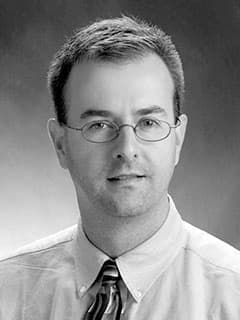
Andrew D. Wells, PhD
Dr. Andrew Wells completed his BA in microbiology in 1991 from Miami University, and his PhD in medical microbiology and immunology in 1996 from the University of Wisconsin-Madison. He joined the Immunobiology of Normal and Neoplastic Lymphocytes training program as a postdoctoral fellow at the University of Pennsylvania, where he studied the cellular and molecular mechanisms by which co-stimulation promotes T lymphocyte function and opposes tolerance. Dr.
About Andrew D. Wells, PhD
Dr. Andrew Wells completed his BA in microbiology in 1991 from Miami University, and his PhD in medical microbiology and immunology in 1996 from the University of Wisconsin-Madison. He joined the Immunobiology of Normal and Neoplastic Lymphocytes training program as a postdoctoral fellow at the University of Pennsylvania, where he studied the cellular and molecular mechanisms by which co-stimulation promotes T lymphocyte function and opposes tolerance. Dr. Wells became as an assistant professor in the Department of Pathology and Laboratory Medicine at the University of Pennsylvania and The Children’s Hospital of Philadelphia in 2002, and was promoted to associate professor with tenure in 2010.
Dr. Wells’ research interests include the regulation of gene expression, DNA methylation, and chromatin structure during T lymphocyte immune responses, and the impact these processes have on the balance between immunity and tolerance. Over the past several years, the Wells laboratory has uncovered several mechanisms by which transcriptional silencing of pro-inflammatory cytokine genes occurs during tolerance, primarily in models of organ transplant tolerance.
Dr. Wells has received five NIH grants, has authored more than 50 journal articles, is an associate editor at the Journal of Immunology, and a full member of the Tolerance, Transplantation and Tumor Immunity NIH study section. He teaches multiple graduate-level courses and has served on multiple committees in the Immunology (IGG) and the Cell and Molecular Biology (CAMB) graduate groups at the University of Pennsylvania. Dr. Wells hopes the discoveries in his laboratory will eventually lead to new therapies for the treatment of autoimmune disease and organ transplant rejection.
Titles
Member, Joseph Stokes Jr. Research Institute
Assistant Professor of Pathology and Laboratory Medicine, University of Pennsylvania School of MedicineEducation & training
Additional Training
University of Wisconsin, Madison, WI